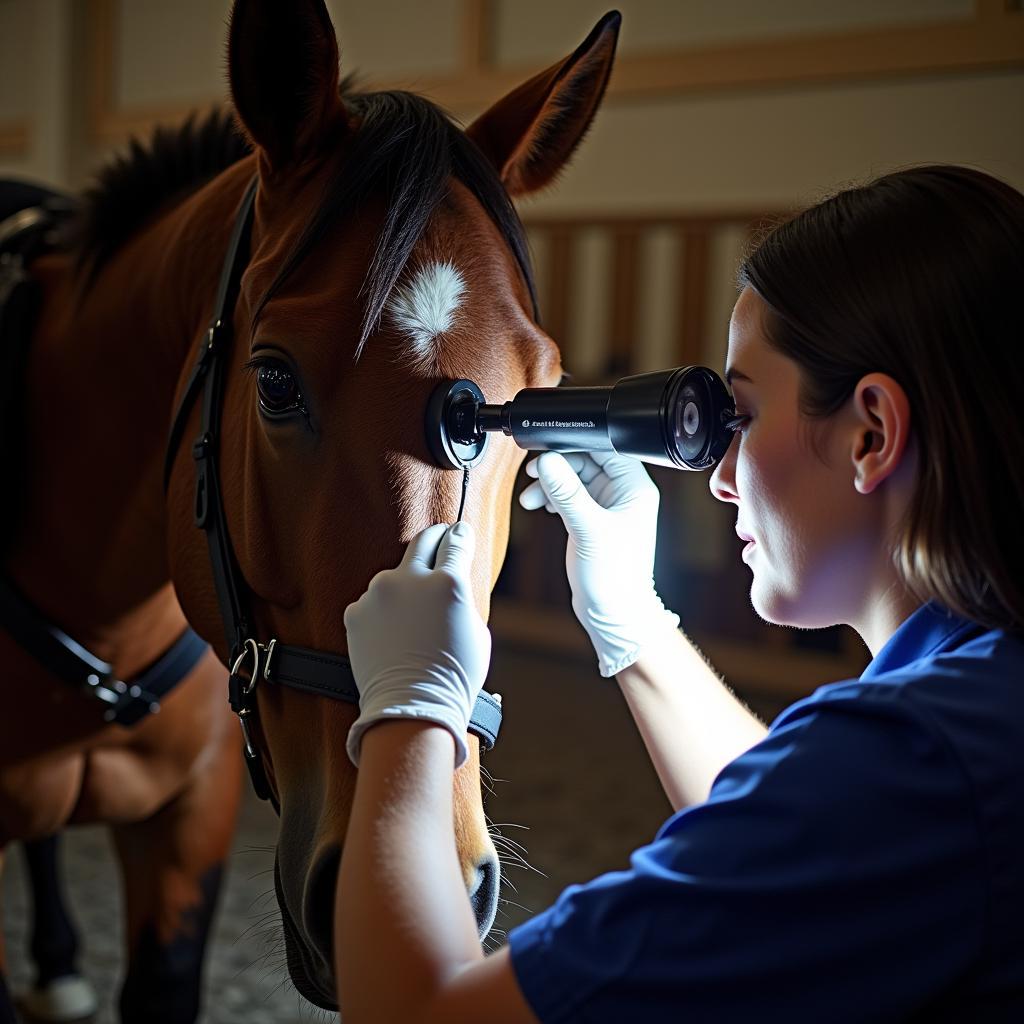Swollen Eyes In Horses, a common equine health concern, can range from mild irritation to severe vision-threatening conditions. Understanding the causes, recognizing the symptoms, and knowing how to treat swollen eyes is crucial for every horse owner. This article will delve into the various reasons behind swollen eyes in horses, discuss treatment options, and offer preventative measures.
Understanding the Causes of Swollen Eyes in Horses
A variety of factors can contribute to swollen eyes in horses, from simple allergies to more complex infections. Identifying the underlying cause is critical for effective treatment.
Common Causes of Swollen Eyes
- Trauma: A direct blow to the eye, scratches from low-hanging branches, or even a rogue fly can cause swelling.
- Allergies: Just like humans, horses can experience allergic reactions to pollen, dust, mold, or certain plants, leading to itchy, watery, and swollen eyes.
- Infections: Bacterial, viral, or fungal infections can cause inflammation and swelling in and around the eye.
- Conjunctivitis: This inflammation of the conjunctiva, the membrane lining the eyelid and covering the white part of the eye, is a common cause of swollen eyes in horses.
- Uveitis: This inflammation of the uvea, the middle layer of the eye, can cause pain, redness, and swelling. Uveitis is a serious condition that requires prompt veterinary attention.
Less Common Causes
While less frequent, other conditions can also contribute to swollen eyes in horses:
- Foreign Bodies: Dust, dirt, or other small particles can become lodged in the eye, causing irritation and swelling.
- Tumors: Although rare, tumors can develop in or around the eye, leading to swelling and other symptoms.
- Systemic Diseases: Certain systemic diseases, such as anemia, can sometimes manifest with eye swelling. You can find more about anemia in horses on our site anemia in horses.
Treating Swollen Eyes in Horses
The appropriate treatment for swollen eyes depends on the underlying cause. Always consult a veterinarian for an accurate diagnosis and treatment plan.
Veterinary Treatment Options
Your veterinarian may recommend various treatments, including:
- Topical Medications: Eye drops or ointments containing antibiotics, anti-inflammatories, or antivirals may be prescribed to address infections or inflammation. how to treat a swollen eye on a horse offers a detailed guide.
- Systemic Medications: In some cases, oral or injectable medications may be necessary to treat underlying conditions.
- Flushing the Eye: Your vet may flush the eye to remove foreign bodies or irritants.
- Surgery: In rare cases, surgical intervention may be required to address tumors or other serious conditions.
“Accurate diagnosis is key,” says Dr. Emily Carter, DVM, specializing in equine ophthalmology. “Treating the underlying cause, not just the symptom, ensures the best outcome for your horse.”
 Veterinarian Examining a Horse's Eye
Veterinarian Examining a Horse's Eye
Preventing Swollen Eyes in Horses
Taking proactive steps can significantly reduce the risk of your horse developing swollen eyes.
Proactive Measures
- Maintain a Clean Environment: Regularly clean your horse’s stall and remove any potential irritants like dust, mold, or excessive ammonia.
- Fly Control: Implement effective fly control measures, including fly masks, sprays, and environmental management. Consider a horse fly mask with nose cover for added protection.
- Regular Eye Checks: Get into the habit of checking your horse’s eyes daily for any signs of redness, swelling, discharge, or squinting.
- Protective Eye Gear: When riding in areas with low-hanging branches or potential hazards, consider using a fly mask or other protective eye gear. If your horse has uveitis, a uveitis horse mask can provide crucial protection from sunlight.
“Prevention is the best medicine,” advises Dr. Carter. “By taking simple preventative measures, you can significantly reduce the likelihood of eye problems in your horse.”
Conclusion
Swollen eyes in horses can have various causes, ranging from minor irritations to severe conditions. Prompt diagnosis and appropriate treatment are vital for preserving your horse’s vision and overall health. By implementing preventative measures and staying vigilant, you can help protect your horse’s eyes and ensure their well-being. If you notice any signs of eye problems in your horse, consult a veterinarian immediately. Swollen eyes should never be ignored.
FAQs
- What are the most common signs of eye problems in horses?
- Can I treat my horse’s swollen eye at home?
- How can I prevent fly bites around my horse’s eyes?
- What are the long-term effects of untreated uveitis?
- When should I call a veterinarian for my horse’s eye swelling?
- Can certain breeds of horses be more prone to eye problems?
- Are there any nutritional supplements that can support eye health in horses?
“Ichthammol ointment can be useful for certain eye conditions,” adds Dr. James Miller, an equine veterinarian with over 20 years of experience. “However, it should only be used under the guidance of a veterinarian.” ichthammol ointment for horses provides further information on this topic.
Need further assistance? Contact us at Phone Number: 0772127271, Email: [email protected] or visit our address: QGM2+WX2, Vị Trung, Vị Thuỷ, Hậu Giang, Việt Nam. We have a 24/7 customer service team.